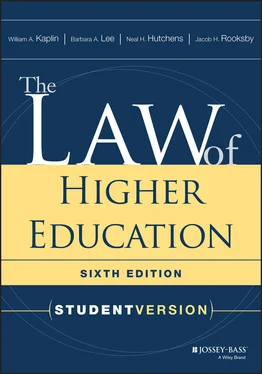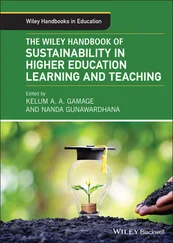If an agreement does not permit an arbitrator to substitute his or her judgment concerning the merits of a tenure decision, a court will overturn an award in which the arbitrator does his or her own review of the grievant's qualifications. For example, in California Faculty Association v. Superior Court of Santa Clara County , 75 Cal. Rptr. 2d 1 (Cal. Ct. App. 1998), a state appellate court affirmed a trial court's decision vacating an arbitration award and remanding the case for another hearing before a different arbitrator. The arbitrator whose decision was challenged had conducted his own review of the scholarly achievements of a grievant who had been denied tenure and had awarded her tenure. The trial court ruled that the arbitrator had exceeded his authority under the collective bargaining agreement, because the standard in the collective bargaining agreement for overturning a negative tenure decision required the arbitrator to find that the president could not have made a “reasoned judgment” in reaching the negative decision and that the arbitrator could state with certainty that the grievant would have been granted tenure otherwise. In this case, the grievant had not received positive recommendations at various stages of the tenure decision process, and the arbitrator based his decision on testimony from witnesses who supported the grievant's quest for tenure, rather than on a review of the record that the president had used to reach his decision. Finding that the arbitrator had substituted his judgment for the president's, the court affirmed the trial court's remedy. For a case with similar facts, see Nash v. Florida Atlantic University Board of Trustees , 213 So.3d 363 (Fla. Dist. Ct. App. 2017).
Whether or not the arbitrator's decision is binding on the parties is also a creature of the contract. Unless the contract explicitly states that the arbitration is binding, the arbitrator's award is not enforceable in court. For example, in Massachusetts Community College Council v. Massachusetts Board of Higher Education/Roxbury Community College , 991 N.E.2d 646 (Mass. 2013), a professor denied tenure at the community college grieved the decision, which then went before an arbitrator. The arbitrator ruled in favor of the faculty member and ordered the college to reinstate the professor and provide him with a second opportunity to be reviewed for tenure. The union filed a claim with a state trial court to confirm the arbitration award. Although the trial court confirmed the award, a state appellate court and the state supreme court disagreed. In reviewing the collective bargaining agreement, the Massachusetts Supreme Court refused to enforce the arbitration award, noting that the language of the collective bargaining agreement made it clear that, although the parties could arbitrate a tenure denial, the outcome of the arbitration was not binding.
Grievants challenging a tenure denial may attempt to state claims of procedural noncompliance that actually attack the substance of the tenure decision. For example, in AAUP, University of Toledo Chapter v. University of Toledo , 797 N.E.2d 583 (Oh. Ct. C.P. 2003), an assistant professor denied tenure challenged the negative decision as a procedural violation, stating that the determinations of the department chair and the dean that the professor had produced an insufficient number of publications violated the contract's procedural requirements. The arbitrator ruled that the agreement had not been violated and found for the university, and the plaintiff appealed the award to a state trial court. The court upheld the arbitrator's award, stating that the contract's procedural requirements afforded the chair and the dean the latitude to determine what weight to give a tenure candidate's publications compared with teaching and service, and that the arbitrator did not exceed his authority by interpreting the contract in the university's favor.
The decision of an institution to limit arbitration of employment decisions to only procedural issues rather than to the merits of the decision may persuade a court to allow a plaintiff to litigate the merits of the decision in court—at least when discrimination is alleged. In Brennan v. King , cited above, a faculty handbook provided for arbitration of procedural issues in tenure disputes but specifically provided that the arbitrator was without the power to grant or deny tenure. Because the arbitration procedure did not provide “a forum for the entire resolution” of the candidate's tenure dispute, said the court, the plaintiff did not have to exhaust his arbitral remedies prior to bringing a lawsuit alleging discrimination.
Although arbitration awards are usually final and binding (unless the agreement provides for some other arrangement, such as “advisory arbitration”), courts are reluctant to overturn an arbitrator's award because the parties to the agreement intended it to be final. Nevertheless, courts will overturn arbitration awards that go beyond the power of the arbitrator, that are viewed as harmful to public policy, or that are a result of arbitrator misconduct (such as a conflict of interest or dishonesty). Generally speaking, a court will examine whether the issues as defined by the parties and the arbitrator are within the terms of the agreement. Second, the authority for the arbitrator's award must be rationally derived from the agreement ( State System of Higher Education v. State College and University Professional Association , 743 A.2d 405 (Pa. 1999)). (See Luzerne County Community College Association of Higher Education v. Luzerne County Community College , 916 A.2d 731 (Pa. Commw. Ct. 2007), upholding the arbitrator's award of promotion because the agreement included such authority; but see Massachusetts Board of Higher Education v. Massachusetts Teachers Association, 943 N.E.2d 485 (Mass. App. Ct. 2011), holding that an arbitrator had exceeded his authority by ordering a college to hire a grievant.)
If an arbitration award is challenged on public policy grounds, the party seeking to overturn the award must demonstrate that the award is contrary to law or some recognized source of public policy. For example, in Illinois Nurses Association v. Board of Trustees of the University of Illinois, 741 N.E.2d 1014 (Ill. App. Ct. 2000), a nurse had been fired for actions that endangered patient safety. An arbitrator reinstated her, ruling that the hospital had not proved one of the charges and that the nurse's long seniority and otherwise good work record mitigated the severity of her misconduct. The court refused to enforce the arbitrator's award, ruling that the nurse's actions had threatened patient safety and thus her reinstatement violated public policy with respect to patient care.
A Pennsylvania appeals court determined that an arbitration award reinstating a faculty member found responsible for engaging in sexual harassment of students violated public policy and thus refused to enforce it. In Slippery Rock University of Pennsylvania v. Association of Pennsylvania State College and University Faculty , 71 A.3d 353 (Pa. Commw. 2013), the university had terminated a tenured faculty member and department chair who had made allegedly inappropriate sexual comments to students while intoxicated on a field trip to Spain that he was leading. Although the arbitrator credited the professor's defense that his comments were “trash talk” and not sexually harassing, the court found that several of the arbitrator's findings were not rationally derived from the collective bargaining agreement, and also that, given the alleged conduct, which the professor admitted, and an earlier instance of sexual harassment by that individual, reinstating the professor violated public policy.
Also, the Supreme Court of New Hampshire vacated an arbitration award that would have reinstated a tenured professor who had lowered evaluations that students had given another instructor. In University System of New Hampshire Board of Trustees v. Dorfsman , 130 A.3d 1219 (N.H. 2015), the university had terminated the professor on the grounds of moral turpitude—one of the “just cause” reasons for termination in the collective bargaining agreement. Although the arbitrator found that the misconduct did constitute moral turpitude, he determined that the termination did not comport with the requirements of just cause and ordered the professor reinstated. The court ruled that the arbitrator acted beyond the scope of his authority; his finding that the professor's misconduct constituted moral turpitude required the arbitrator to uphold the termination.
Читать дальше












